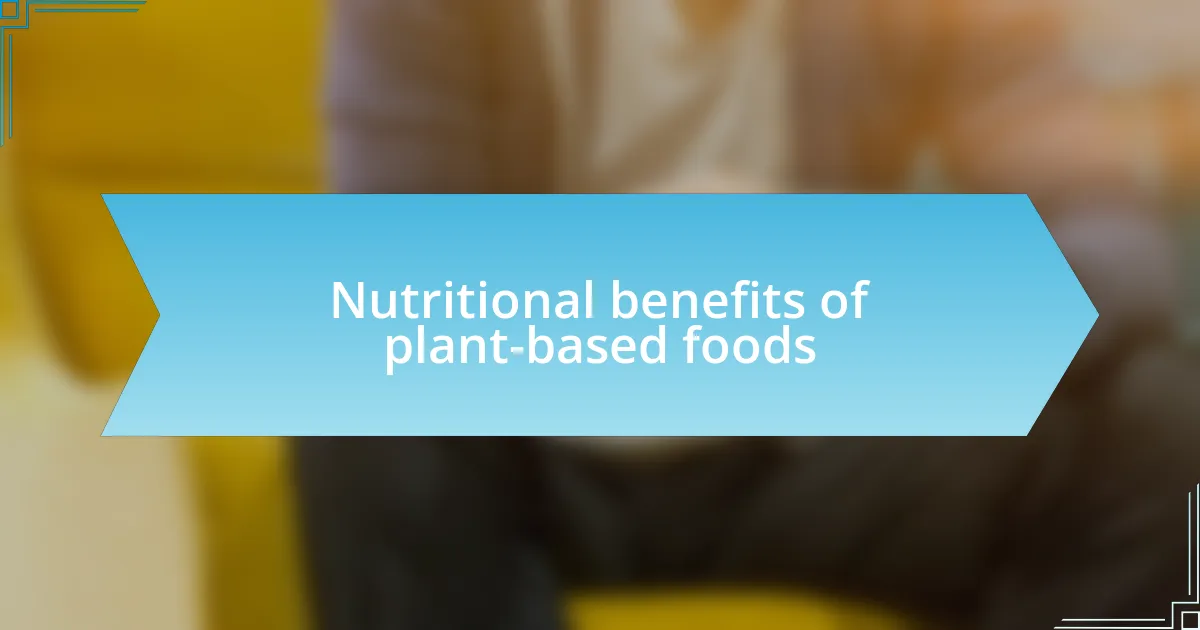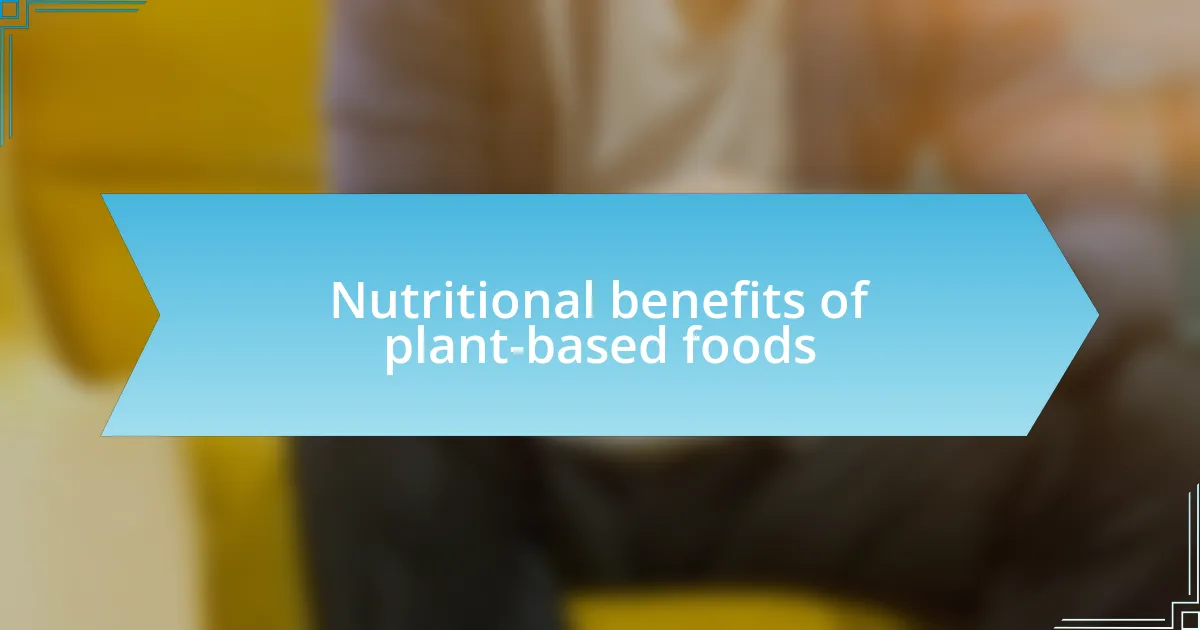Key takeaways:
- Plant-based diets are driven by health benefits, environmental concerns, and social connections, becoming a lifestyle choice for many.
- Nutritional advantages include high fiber content, antioxidants, heart-healthy fats, and a variety of essential vitamins.
- Common misconceptions about plant-based diets include fears of lack of flavor, protein, and high costs, which can be addressed with creativity and knowledge.
- Effective transitioning tips involve starting with manageable changes, meal prepping, and finding community support for motivation.

Understanding plant-based eating trends
Plant-based eating trends have gained momentum not just for their health benefits but also for their ethical implications. I remember when I first made the switch to plant-based eating; it felt like uncovering a new world of flavors and textures. It’s fascinating how these trends reflect a shift in people’s values towards sustainability and animal welfare, isn’t it?
As I navigated this lifestyle, I noticed how social media played a crucial role in shaping perceptions around plant-based diets. I often found inspiration in vibrant photos of plant-based meals that friends shared. It made me wonder, how much of our food choices are influenced by visual platforms and communal experiences?
The increasing popularity of plant-based options in restaurants and supermarkets is also hard to ignore. I’ve experienced joy in exploring various cuisines that previously didn’t showcase plant-based meals. Seeing this evolution sparks excitement about what’s next for food culture, doesn’t it? As we continue to explore these trends, it’s clear that plant-based eating is not just a trend for many—it’s becoming a lifestyle choice deeply connected to our health, environment, and ethical beliefs.

Reasons for adopting plant-based diets
Adopting a plant-based diet can significantly improve personal health. I recall visiting my doctor for a routine check-up, and after switching to more plant-based meals, my cholesterol levels plummeted, much to both our surprises. My experience reinforces how such dietary choices can lead to tangible health benefits like weight loss and improved digestion.
Beyond health, many people opt for plant-based diets due to environmental concerns. I often find myself reflecting on the impact of livestock farming on our planet. When I learned about the vast resources required for meat production, it motivated me to make conscious choices that not only nourish me but also support a more sustainable world.
Social connections also play a pivotal role in adopting plant-based eating. I remember hosting a dinner party where I served a fully plant-based menu. The joy and surprise on my friends’ faces as they savored each dish deepened our bond, showcasing that plant-based meals can be both delicious and a way to create shared experiences around the table.
| Reason | Personal Experience |
|---|---|
| Health Improvements | Significant drop in cholesterol after adopting more plant-based meals. |
| Environmental Impact | Moved by the resources needed for meat production, driving my dietary choices. |
| Social Connections | Shared joy and surprise from friends at a plant-based dinner party. |

Nutritional benefits of plant-based foods
Nutritional benefits of plant-based foods
The nutritional profile of plant-based foods is impressive and often overlooked. I remember experimenting with various legumes, nuts, and grains, and was astounded at how they boosted my energy levels. It’s refreshing to realize how these nutrient-dense options can provide essential vitamins and minerals, leaving me feeling vibrant and healthy.
Here are some key nutritional benefits that stand out to me:
- High in Fiber: Plant-based foods are rich in dietary fiber, promoting healthy digestion and aiding in weight management.
- Rich in Antioxidants: Many fruits and vegetables are packed with antioxidants that help combat oxidative stress and inflammation.
- Heart-Healthy Fats: Foods like avocados and nuts contain healthy fats that can improve heart health and lower cholesterol levels.
- Variety of Vitamins: Plant sources are abundant in vitamins such as Vitamin C, A, and several B vitamins, which are essential for overall health.
One of my favorite dishes now is a vibrant quinoa salad loaded with vegetables and chickpeas, showcasing how delicious and nutritious plant-based eating can be. Each bite reminds me not just of the flavors, but of the positive impact I’m making on my health.”

Common misconceptions about plant-based eating
There’s a pervasive myth that plant-based eating means sacrificing flavor. I remember my first foray into plant-based cooking; I was skeptical. But when I tasted a rich, smoky lentil stew bursting with spices, I realized just how satisfying plant-based meals can be. Have you ever considered how diverse flavors from around the world can come from simple, whole ingredients?
Another common misconception is that plant-based diets lack protein. I’ve often had people raise their eyebrows when I mentioned my love for chickpeas and quinoa. The truth is, I’ve found that not only do these foods provide ample protein, but they also come with additional nutrients that animal sources may not offer. It’s amazing to learn how many different plant sources can seamlessly fit into a protein-rich meal.
Some folks worry that going plant-based is too expensive or requires hard-to-find ingredients. I’ve certainly felt that initial hesitation. However, I’ve discovered that staples like beans, rice, and seasonal vegetables are not only budget-friendly but also create the foundation for countless delicious meals. Isn’t it interesting how a bit of creativity can transform simple ingredients into something extraordinary?

Tips for transitioning to plant-based
Starting your journey toward a plant-based diet doesn’t have to feel overwhelming. When I decided to make the shift, I remember beginning with just one meatless meal a week. It felt manageable, and as time passed, I found myself excitedly exploring new recipes and ingredients. Have you ever noticed how gradual changes can lead to unexpected joy in your meals?
Meal prepping became a game changer for me. On Sundays, I would block out a couple of hours to chop vegetables, cook grains, and prepare sauces. This not only saved me time during the week but also fueled my enthusiasm for trying different combinations. Isn’t it rewarding to open your fridge and see a colorful array of plant-based options ready to be enjoyed?
Lastly, don’t hesitate to lean on the community for support. I joined local online groups where people share their favorite recipes and tips. Reading about others’ journeys inspired me to experiment and dive deeper into plant-based living. Who knew that finding a supportive network could amplify the experience so much?

Popular plant-based diet plans
Many people gravitate toward well-known plant-based diet plans such as the Mediterranean diet or the Flexitarian diet. The Mediterranean diet emphasizes whole grains, fruits, vegetables, and healthy fats like olive oil, making it not just heart-friendly but also flavor-packed. It was striking how incorporating just a few Mediterranean dishes made my meals not only healthier but also vivid and immensely satisfying.
On the other hand, the Flexitarian diet provides a flexible approach that allows for occasional meat consumption, which can make the transition smoother for many. I remember initially feeling hesitant about committing completely to a vegetarian lifestyle, and knowing I could still enjoy a burger once in a while helped ease my anxiety. This kind of flexibility offers a perfect blend of plant-based goodness and personal choice, right?
Then there’s the Whole Food Plant-Based (WFPB) approach, which focuses on unprocessed foods. It’s incredible how my energy levels soared when I removed refined sugar and flour from my meals. Have you noticed how pure, wholesome ingredients can restore not just your health but also your mood? Simultaneously, I found it inspiring to create colorful, nutrient-dense dishes that fueled not just my body, but also my creativity in the kitchen.

Long-term effects of plant-based lifestyles
Transitioning to a plant-based lifestyle can lead to significant long-term health benefits. For instance, I’ve noticed a remarkable reduction in my cholesterol levels since adopting this way of eating. Isn’t it fascinating how our diet can have such a direct influence on our body’s health over the years?
I often reflect on the sustainability aspect of plant-based diets, both for personal well-being and the environment. After making this shift, I’ve felt more connected to my food choices and the impact they have on the planet. It could feel empowering to know that what I eat not only nourishes me but also contributes to a more sustainable future.
However, I’ve also observed that some people may struggle with nutrient deficiencies in the long run, especially in areas like vitamin B12 and iron. When I first started, I had to find ways to supplement my diet wisely, and I learned that being informed is key. Have you ever considered how important it is to balance your nutrient intake on this journey?
















